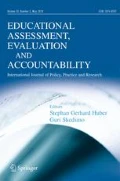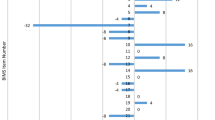Abstract
Accountability in education is not new. Schools have always been accountable in one way or another to the communities they serve, regardless of the policy environment of the time (Elmore, The Educational Forum, 69:134–142, 2005). This article explores how three principals from Ontario, Canada manage the tensions of multiple accountability systems in their work. Findings indicate that the principals were able to find ways to be accountable to a variety of communities and ideals by prioritizing and honoring local needs and beliefs within the larger provincial mandate. Principals could not ignore the various accountability pressures; indeed, their success hinged on the ability to negotiate them. This delicate balancing act requires school principals to develop skills necessary to successfully juggle these competing demands.
Similar content being viewed by others
Notes
The ISSPP now currently consists of 20 countries that have produced over 100 cases since 2001 as part of this research network.
References
Abelmann, C., & Elmore, R. F. (1999). When accountability knocks, will anyone answer? Consortium for Policy Research in Education (CPRE RR-42). University of Pennsylvania, School of Graduate Studies
Anderson, J. (2005). The International Academy of Education (IAE). Brussels: UNESCO.
Auerbach, C. F., & Silverstein, L. B. (2003). Qualitative data: an introduction to coding and analysis. New York: New York University Press.
Belfield, C. (2005). The teacher labour market in the US: Challenges and reforms. Educational Review, 57(2), 175–91.
Ben Jaafar, S., & Earl, L. (2008). Comparing performance-based accountability models: a Canadian example. Canadian Journal of Education.
BusinessDirectory.com. (n.d.). Accountability. Retrieved from http://www.businessdictionary.com/definition/accountability.html#ixzz2RnVP5CaI. Accessed 26 Mar 2013.
Campbell, C., & Levin, B. (2009). Using data to support educational improvement. Educational Assessment, Evaluation and Accountability, 21(1), 47–65.
Christophersen, K. A., Elstad, E., & Turmo, A. (2010). Is teacher accountability possible? The case of Norwegian High School Science. Scandinavian Journal of Educational Research, 54(5), 413–429.
Court, M., & O’Neill, J. (2011). ‘Tomorrow's schools’ in New Zealand: From social democracy to market managerialism. Journal of Educational Administration and History, 43(2), 119–140.
Curtin, M., & Fossey, E. (2007). Appraising the trustworthiness of qualitative studies: guidelines for occupational therapists. Australian Occupational Therapy Journal, 54, 88–94.
Darling-Hammond, L. (1989). Accountability for professional practice. Teachers College Record, 91(1), 59–80.
Drysdale, L., Goode, H., & Gurr, D. (2009). An Australian model of successful school leadership: moving from success to sustainability. Journal of Educational Administration, 47(6), 697–708.
Dzakiria, H. (2012). Theory of relatability as a possible alternative to the issue of generalising of research findings: the case of open and distance learning (ODL) at University Utara Malaysia. Malaysian Journal of Distance Education, 14(1), 41–58.
Education Improvement Commission. (2000). School improvement planning: a handbook for principals, teachers and school councils. Toronto: Author.
Education Quality and Accountability Office. (2013). Ontario student achievement: English language students. Retrieved from http://www.eqao.com/ProvincialReport/Files/13/PDF/ProvincialReport_Secondary_en_2013.pdf. Accessed 26 Mar 2013.
Education Quality and Accountability Office (EQAO). (2005). EQAO Guide to School and Board Improvement Planning: A Handbook for School and Board Leaders. Retrieved from http://www.eqao.com/pdf_e/05/05P011e.pdf. Accessed 26 Mar 2013.
Elmore, R. (2005). Accountable leadership. The Educational Forum, 69, 134–142.
Emstad, A. B. (2011). The principal’s role in the post-evaluation process.—How does the principal engage in the work carried out after the schools self-evaluation? Educational Assessment, Evaluation and Accountability, 23(4), 271–288.
Firestone, W. A., & Shipps, D. (2007). How do leaders interpret conflicting accountabilities to improve student learning? In W. A. Firestone & C. Riehl (Eds.), A new agenda for research in educational leadership (pp. 81–100). New York: Teachers College Press.
Firestone, W. A., Mayrowetz, D., & Fairman, J. (1998). Performance‐based assessment and instructional change: the effect of testing in Maine and Maryland. Educational Evaluation and Policy Analysis, 20(2), 95–113.
Fitz‐Gibbon, C. T., & Kochan, S. (2000). School effectiveness and educational indicators. In C. Teddie & D. Reynolds (Eds.), The international handbook of school effectiveness research (pp. 257–282). London: Falmer Press.
Glesne, C. (1999). Becoming qualitative researchers: an introduction (2nd ed.). Don Mills: Longman.
Goldschmidt, P., Roschewski, P., Choi, K., Auty, W., Hebbler, S., Blank, R., & Williams, A. (2005). Policymakers’ guide to growth models for school accountability: how do accountability models differ? Washington: A paper commissioned by the Councils of Chief State School Officers.
Hanushek, E. A., & Raymond, M. E. (2005). Does school accountability lead to improved student performance? Journal of Policy Analysis and Management, 24, 297–327.
Harris, D. N., & Herrington, C. D. (2006). Accountability, standards, and the growing achievement gap: lessons from the past half‐century. American Journal of Education, 112(2), 209–238.
Hart, D., & Livingstone, D. (2009). Public attitudes towards education in Ontario 2009: The 17th OISE survey of educational issues Retrieved March 22, 2010, from http://www.oise.utoronto.ca/oise/About_OISE/OISE_Survey/
Harvey, E. B., & Houle, R. (2006). Demographic changes in Canada and their impact on public education. Toronto, Ontario: The Learning Partnership.
Hobbie, M., Covey, J. J., & Schuttloffel, M. J. (2010). The impact of Catholic school identity and organizational leadership on the vitality of elementary Catholic schools. Catholic Education: A Journal of Inquiry and Practice, 14(1), 7–23.
Jacobson, S., & Day, C. (2007). The International Successful School Principalship Project (ISSPP): an overview of the project, the case studies and their contexts. International Studies in Educational Administration (Commonwealth Council for Educational Administration & Management (CCEAM), 35(3), 3–17.
Johnson, L. (2007). Rethinking successful school leadership in challenging U.S. schools: culturally responsible practices in school—community relationships. International Studies in Educational Administration, 35(3), 49–59.
Knapp, M. S., & Feldman, S. B. (2012). Managing the intersection of internal and external accountability: challenge for urban school leadership in the United States. Journal of Educational Administration, 50(5), 666–694.
Krippendorff, K. (2004). Reliability in content analysis: some common misconceptions and recommendations. Human Communication Research, 30(3), 411–433.
Lauen, D. L. (2013). Jumping at the chance: the effects of accountability incentives on student achievement. Journal of Research on Educational Effectiveness, 6(2), 93–113.
Lichtman, M. (2010). Qualitative research in education: a user’s guide (2nd ed.). Thousand Oaks: SAGE Publications.
Lingard, B., & Douglas, P. (1999). Men engaging feminisms: Pro-feminism, backlashes and schooling. Buckingham, UK: Open University Press.
MacDougall, C. (1997). The Devil’s Advocate: a strategy to avoid groupthink and stimulate discussion in focus groups. Qualitative Health Research, 7(4), 532–541. doi:10.1177/104973239700700407.
McGregor, D., Hooker, B., Wise, D., & Devlin, L. (2010). Supporting professional learning through teacher educator enquiries: An ethnographic insight into developing understandings and changing identities. Professional Development in Education, 36(1-2), 37–41.
Maher, F. A., & Tetreault, M. K. (1993). Frames of positionality: constructing meaningful dialogue about gender and race. Anthropological Quarterly, 66(3), 118–126.
Mapp, K. L. (2002). Having their say: parents describe why and how they are engaged in their children’s learning. School Community Journal, 13(1), 35–64.
Merriam, S. (2009). Qualitative research a guide to design and implementation San Francisco, CA: John Wiley & Sons.
Miles, M. B., & Huberman, A. M. (1994). Qualitative data analysis: an expanded sourcebook. Thousand Oaks: SAGE Publications.
Møller, J., Vedøy, G., Presthus, A. M., & Skedsmo, G. (2009). Successful principalship in Norway: sustainable ethos and incremental changes? Journal of Educational Administration, 47(6), 731–741.
Mourshed, M., Chijioke, C., & Barber, M. (2010). How the world’s most improved school systems keep getting better. London: McKinsey & Company.
Normone, A. H. (2004). The edge of chaos: school administrators and accountability. Journal of Educational Administration, 43(1), 55–77.
Ontario Ministry of Education. (2010b). What We Do. Ministry of Education / Ministère de l'Éducation. Retrieved April 2, 2011, from http://www.edu.gov.on.ca/eng/about/whatwedo.html. Accessed 26 Mar 2013.
Ontario Focused Intervention Partnership (OFIP). (2013). Initatives: Ontario Focused Intervention Partnership (OFIP). Retrieved from https://www.edu.gov.on.ca/eng/literacynumeracy/ofip.html. Accessed 26 Mar 2013.
Ontario Principals’ Council. (2001). Unrecognized exodus, unaccepted accountability: The looming shortage of principals and vice principals in Ontario public school boards. Retrieved from http://www.principals/ca/documents/QueensStudy_fullreport.pdf. Accessed 26 Mar 2013.
Pollock, K. (2013). School success in a publicly-funded, Catholic school. Catholic Education: A Journal of Inquiry and Practice, 16(2), 313–338.
Pollock, K., & Winton, S. (2012). School improvement: A case of competing priorities. Journal of Cases in Educational Leadership, 15(3), 11–21.
Popham, W. J. (1999). Where large scale educational assessment is heading and why it shouldn’t. Educational Measurement: Issues and Practice, 18(3), 13–17.
Riahani. (2008). An Indonesian model of successful school leadership. Journal of Educational Administration, 46(4), 481–496.
Seidman, I. (1998). Interviewing as qualitative research (2nd ed.). New York: Teachers College Press.
Statistics Canada. (2010). Measuring up: Canadian results of the OECD PISA study. Ottawa: Author.
Stecher, B. M., & Kirby, S. N. (2004). Organizational improvement and accountability: Lessons for education from other sectors. Santa Monica: The Rand Corporation.
Stone, B., Jabbra, J. G., & Dwivedi, O. P. (Eds.). (1989). Public service accountability: a comparative perspective. Hartford: Kumarian Press.
Sun, M., Youngs, P., Yang, H., Chu, H., & Zhao, Q. (2012). Association of district principal evaluation with learning-centered leadership practice: evidence from Michigan and Beijing. Educational Assessment, Evaluation and Accountability, 24(3), 189–213.
The Literacy and Numeracy Secretariat. (2008). Teaching-learning critical pathways. The Capacity Building Series, Special Edition #6.
Valli, L., Croninger, R. G., & Walters, K. (2007). Who (else) is the teacher? Cautionary notes on teacher accountability systems. American Journal of Education, 113(4), 635–662.
Wallace, J. (2010). Facing “reality”: including the emotional in school leadership programmes. Journal of Educational Administration, 48(5), 595–610.
Wiliam, D. (2010). Standardized testing and school accountability. Educational Psychologist, 45(2), 107–122.
Winton, S. (2013). How Schools Define Success: The Influence of Local Contexts on the Meaning of Success in Three Schools in Ontario, Canada. Comparative and International Education / Éducation Comparée et Internationale, 42(1), Article 5.
Winton, S., & Pollock, K. (2015). Meanings of success and successful leadership in Ontario, Canada, in neo-liberal times. Journal of Educational Administration and History. doi:10.1080/00220620.2015.1040378.
Wöbmann, L., Lüdemann, E., Schütz, G., & West, M. R. (2007). School accountability, autonomy, choice, and the level of student achievement: International evidence from PISA 2003 (OECD Education Working Papers, Number 13). Organisation for Economic Co-operation and Development (OECD): Directorate for Education. doi:10.1787/246402531617.
Yin, R. K. (2009). Case study research: design and methods. Thousand Oaks: Sage.
Yu, F., Kennedy, E., Teddlie, C., & Crain, M. (2007). Identifying Effective and Ineffective Schools for Accountability Purposes: A Comparison of Four Generic Types of Accountability Models. Retrieved January, 2013 from
Author information
Authors and Affiliations
Corresponding author
Rights and permissions
About this article
Cite this article
Pollock, K., Winton, S. Juggling multiple accountability systems: how three principals manage these tensions in Ontario, Canada. Educ Asse Eval Acc 28, 323–345 (2016). https://doi.org/10.1007/s11092-015-9224-7
Received:
Accepted:
Published:
Issue Date:
DOI: https://doi.org/10.1007/s11092-015-9224-7



